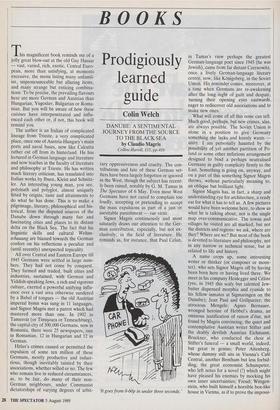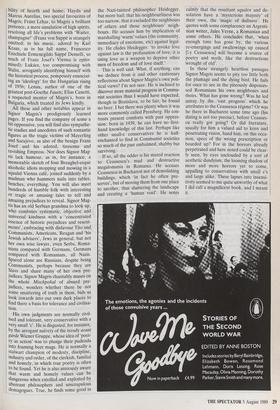BOOKS
Prodigiously learned guide
Conn Welch
DANUBE: A SENTIMENTAL JOURNEY FROM THE SOURCE TO THE BLACK SEA by Claudio Magris Collins Harvill, £15, pp.416 This magnificent book reminds me of a jolly great blow-out at the old Gay Hussar — vast, varied, rich, exotic, Central Euro- pean, more than satisfying, at moments excessive, the menu listing many unfamil- iar, unpronounceable but alluring items, and many strange but enticing combina- tions. To be precise, the prevailing flavours here are more German and Austrian than Hungarian, Yugoslav, Bulgarian or Roma- nian. But you will be aware of how these cuisines have interpenetrated and influ- enced each other or, if not, this book will remind you.
The author is an Italian of complicated lineage from Trieste, a very complicated place, once one of Austria-Hungary's main ports and naval bases, now like Calcutta rather cut off from its hinterland. He has lectured in German language and literature and now teaches in the faculty of literature and philosophy at Trieste. He has written much literary criticism, has translated into Italian works by Ibsen, Kleist and Schnitz- ler. An interesting young man, you see, polymath and. polyglot, almost uniquely fitted by origins, taste and attainments to do what he has done. This is to make a pilgrimage, literary, philosophical and his- torical, from the disputed sources of the Danube down through many fair and fascinating cities and places to its distant delta on the Black Sea. The fact that his linguistic skills and cultural Weltan- schauung are biassed towards the German confers on his reflections a peculiar and (until recently) unexpected topicality.
All over Central and Eastern Europe till 1945 Germans were settled in large num- bers. They had not come by conquest. They farmed and traded, built cities and industries, sustained, with German and Yiddish-speaking Jews, a rich and vigorous culture, exerted a powerful unifying influ- ence over a vast area otherwise sundered by a Babel of tongues — the old Austrian imperial hymn was sung in 11 languages, and Signor Magris met a parrot which had mastered more than one. In 1902 in Tamesvar (or Timi§oara or Temeschburg), the capital city of 300,000 Germans, now in Romania, there were 25 newspapers, one in Romanian, 12 in Hungarian and 12 in German.
Hitler's crimes caused or permitted the expulsion of some ten million of these Germans, mostly productive and indust- rious, though inevitably tainted by their associations, whether willed or no. The few who remain live in reduced circumstances, as, to be fair, do many of their non- German neighbours, under Communist dictatorships of varying degrees of arbit-
rary oppressiveness and cruelty. The con- tributions and fate of these German set- tlers have been largely forgotten or ignored in the West, though the subject has recent- ly been raised, notably by G. M. Tamas in The Spectator of 6 May. Even most West Germans have not cared to complain too loudly, accepting or pretending to accept the mass expulsions as part of a just 'or inevitable punishment — vae victis.
Signor Magris continuously and most salutarily draws our attention to the Ger- man contribution, especially, but not ex- clusively, in the field of literature. He reminds us, for instance, that Paul Celan, 'It goes from 0-60p in under three seconds.' in Tamas's view perhaps the greatest German-language poet since 1945 (he was Jewish), came from far distant Czernowitz, once a lively German-language literary centre, now, like Konigsberg, in the Soviet Union. His reminder comes, moreover, at a time when Germans are re-awakening after the long night of guilt and despair, turning their opening eyes eastwards, eager to rediscover old associations and to make new ones.
What will come of all this none can tell. Much good, perhaps, but new crimes, alas, are always possible. The Soviet Union is alone in a position to give Germany something she lacks and keenly wants — unity. I am personally haunted by the possibility of yet another partition of Po- land or some other nefarious arrangement designed to bind a perhaps neutralised Germany in guilty complicity firmly to the East. Something is going on, anyway, and on a part of this something Signor Magris throws, without particularly meaning to, an oblique but brilliant light.
Signor Magris has, in fact, a sharp and understanding eye for architecture, a ready ear for what it has to tell us. A few pictures would have been welcome here, to show us what he is talking about, nor is the single map over-communicative. The towns and villages he visited are all marked, but not the districts and regions: we ask, where are they? Where are we? But most of the book is devoted to literature and philosophy, not in any narrow or technical sense, but as related to life and history.
A name crops up, some interesting writer or thinker (or composer or mons- ter), who sets Signor Magris off by having been born here or having lived there. We meet in his company Heidegger and Cdline (yes, in 1945 this scaly but talented Jew- baiter dispensed morphia and cyanide to his fellow inmates at Sigmaringen on the Danube); Jean Paul and Grillparzer; the atrocious Mengele; Agnes Bernauer, wronged heroine of Hebbel's drama, an ominous justification of raison d'gtat, not found by Magris convincing; the quiet and contemplative Austrian writer Stifter and the drably devilish Austrian Eichmann; Bruckner, who conducted the choir at Stifter's funeral — a small world, indeed, but great in genius; Peter Altenberg, whose dummy still sits in Vienna's Café Central, another Bentham but less forbid- ding; the great economist Schumpeter, who left notes for a novel (!) which might have pleased his enemies by mocking his own inner uncertainties; Freud; Wittgen- stein, who built himself a horrible box-like house in Vienna, as if to prove the impossi-
bility of hearth and home; Haydn and Marcus Aurelius, two special favourites of Magris; Franz Lehar, to Magris a brilliant pretence, a mere simulation of high spirits, resolving all life's problems with 'Waiter, champagne!' (Franz von Suppe is strangely omitted: in his music, adored by Karl Kraus, as in his full name, Francesco Ezechiele Ermenegildo Suppe Demelli, so much of Franz Josef's Vienna is epito- mised); Lukacs, too compromising with Stalin, arrogantly identifying himself with the historical process, pompously enunciat- ing an 'ideology' for the Hungarian rising of 1956; Lenau, author of one of the greatest post-Goethe Fausts; Elias Canetti, a respected mentor of Magris's, born in Bulgaria, which treated its Jews kindly.
All these and other notables appear in Signor Magris's prodigiously learned Pages. If you find the company of some a bit oppressive, you will find also sympathe- tic studies and anecdotes of such romantic figures as the tragic victims of Mayerling and Sarajevo, as also of the benign Franz Josef and his adored, tiresome and ravishing Empress. Nor does Signor Mag- ris lack humour, as in, for instance, a memorable sketch of four Breughel-esque alcoholic idiots mopping and mowing in a squalid Vienna café, joined suddenly by a madman who hammers nails into tables, benches, everything. You will also meet hundreds of humble folk with interesting or tragic or amusing tales to tell and amazing prejudices to reveal. Signor Mag- ris has an old Serbian grandma to look up, who combines systematic, objective and universal kindness with a 'concentrated essence of historic prejudices and resent- ments', embracing with disfavour Tito and Communists, Americans, Reagan and 'his Jewish advisers', Jews in general, but not her own wise lawyer, even Serbs, Roma- mans compared with Germans, Germans compared with Romanians, all Nazis. Spared alone are Russians, despite being Communists, perhaps because they are Slays and share many of her own pre- judices. Signor Magris charitably muses on the whole Mischpokal of absurd pre- judices, wonders whether there be not some smattering of truth in them, bids us look inwards into our own dark places to find there a basis for tolerance and civilisa- tion.
His own judgments are normally civil- ised and tolerant, very conservative with a very small 'c'. He is disgusted, for instance, by the arrogant naivety of the trendy avant garde Wiener Gruppe, whose idea of 'poet- ry as action' was to plunge their pudenda into foaming beer mugs. He is normally a stalwart champion of modesty, discipline, Industry and order, of the clerkish, familial and homely, in which true poetry is often to be found. Yet he is also anxiously aware that warm and homely values can be dangerous when extolled and exploited by aberrant philosophers and unscrupulous demagogues. True, he finds some good in the Nazi-tainted philosopher Heidegger, but more bad; that his neighbourliness was too narrow, that it excluded the neighbours of others and those neighbours' neigh- bours. He accuses him by implication of marshalling 'warm' values (the community, immediacy of emotions, etc) against legal- ity. He chides Heidegger: `to invoke love against law is the profanation of love; it is using love as a weapon to deprive other men of freedom and of love itself.'
This is well said. What, if anything, can we deduce from it and other cautionary reflections about Signor Magris's own poli- tical views? I'm not sure. He is inclined to discover more material progress in Commu- nist societies than I would have expected, though in Bratislava, to be fair, he found no beer. I bet there was plenty when it was more commonly called Pressberg. He con- trasts present comforts with past oppres- sion: born in 1939, he can have no first- hand knowledge of this last. Perhaps like other small-c conservatives he is half- enchanted to find in Communist societies so much of the past embalmed, shabby but surviving. If so, all the odder is his muted reaction to Ceausescu's mad and destructive megalomania in Romania. He accuses Ceausescu in Bucharest not of demolishing buildings, which in fact he often pre- serves', but of moving them from one place to another, thus shattering the landscape and creating a 'human void'. He notes calmly that the resultant squalor and de- solation have a 'mysterious majesty' of their own, the 'magic of dullness'. He quotes with some complacency an Argenti- nian writer, Jules Verne, a Romanian and some others. He concludes that, 'when enough time has gone by, the various re-emergings and swallowings up caused [L•y Ceausescu] will become a source of poetry and myth, like the destructions wrought of old'.
In these strangely heartless passages Signor Magris seems to pity too little both the plumage and the dying bird. He fails for once to see in the piteously disposses- sed Romanians his own neighbours and theirs. What has gone wrong? Was he led astray by the 'vast progress' which he attributes to the Ceausescu regime? Or was he there in Bucharest some time ago (his dating is not too precise), before Ceauses- cu really got going? Or did literature, usually for him a valued aid to keen and penetrating vision, hand him, on this occa- sion, specs of the wrong prescription or boarded up? For in the horrors already perpetrated and here noted could be clear- ly seen, by eyes unclouded by a sort of aesthetic dandyism, the looming shadow of more and more horrors yet to come, appalling to conservatives with small c's and large alike. These lapses into insensi- tivity seemed to me quite unworthy of what I did call a magnificent book, and I meant it.



















































 Previous page
Previous page